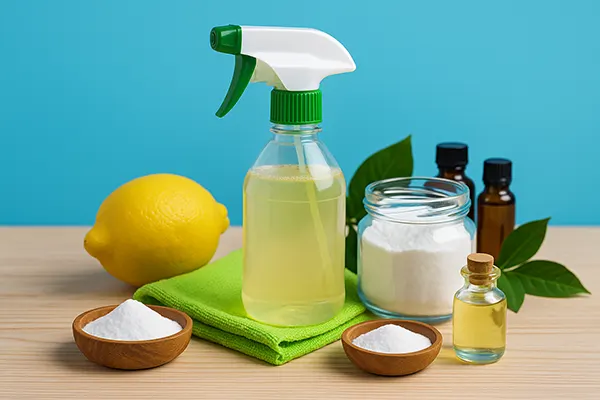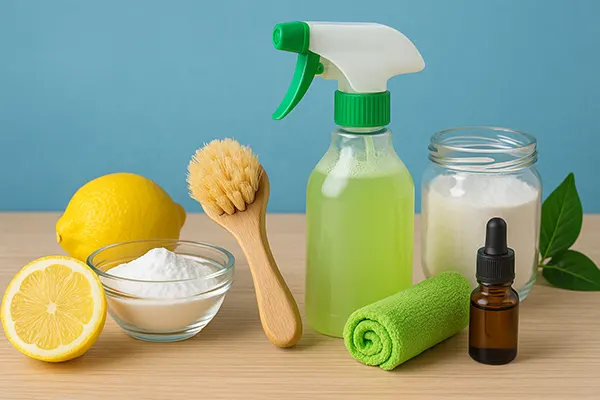
Eco-Friendly Cleaning: Safe Homemade Recipes for a Healthier Home
As concerns about chemical exposure and environmental damage grow, more households are turning to safe, eco-friendly cleaning solutions. Natural ingredients not only clean effectively but also reduce pollution and health risks. This guide offers detailed insights into creating homemade products that support a clean and sustainable home environment.
Understanding the Benefits of Green Cleaning
Eco-friendly cleaning methods reduce the reliance on industrial chemicals, many of which contain toxic compounds that affect respiratory and skin health. Using natural alternatives helps protect your family while supporting broader environmental goals such as reducing water contamination and plastic waste.
Natural ingredients like vinegar, baking soda, lemon juice, and essential oils are effective at cutting grease, removing stains, and disinfecting surfaces. They are biodegradable, widely available, and affordable, making them suitable for daily use without harmful side effects.
In addition to health and environmental benefits, green cleaning can also extend the life of your furnishings and appliances. Gentle, pH-balanced substances avoid the wear-and-tear caused by corrosive products, making eco-cleaning both safe and economical.
Why Homemade Products Make a Difference
When you prepare cleaning solutions at home, you control every ingredient. This eliminates unnecessary additives like synthetic fragrances and dyes, which can trigger allergies or skin irritation. Homemade cleaners are often gentler and safer, particularly for households with children or pets.
Making your own cleaning agents also supports waste reduction. Instead of constantly purchasing new containers, you can reuse bottles and jars, significantly lowering your plastic consumption and carbon footprint over time.
Furthermore, preparing natural cleaners fosters awareness about environmental responsibility. It encourages mindful consumption and helps develop long-term habits that prioritise health and sustainability in the household routine.
Top Homemade Cleaning Recipes with Natural Ingredients
One of the most versatile all-purpose cleaners can be made using just white vinegar and water in equal parts. Add 10 drops of tea tree or lavender essential oil for added antibacterial properties and a pleasant aroma. This solution is excellent for countertops, glass, and tiles.
To scrub sinks, tubs, or ovens, mix baking soda with a bit of castile soap to create a paste. This mildly abrasive compound lifts grime and soap scum effectively without scratching surfaces. For tougher jobs, sprinkle baking soda directly and spray with vinegar to create a fizzy reaction.
As a natural floor cleaner, combine 1/4 cup of white vinegar with 1 litre of warm water. Add a few drops of lemon or eucalyptus oil for freshness. Avoid using vinegar on marble or granite, as the acidity can damage stone surfaces over time.
Cleaning Windows and Mirrors Naturally
Commercial glass cleaners often leave streaks and contain ammonia, which is hazardous in poorly ventilated spaces. A safer alternative is mixing 2 tablespoons of vinegar with 500ml of water and 1 tablespoon of cornstarch. Shake well before each use.
Spray the solution directly onto the glass and wipe with a lint-free cloth or newspaper for a streak-free shine. The cornstarch cuts residue and improves clarity, leaving windows clean and sparkling without smears or chemical smells.
For added degreasing power in kitchens, a splash of lemon juice in the mix boosts the formula’s ability to cut oily films, especially on cooker hoods and microwave doors. Always spot-test natural solutions before full application.

Addressing Mould, Bacteria and Odours Organically
Persistent bathroom mould and mildew can be treated using a paste of bicarbonate of soda and hydrogen peroxide. Apply to affected areas and allow to sit for at least 30 minutes before scrubbing. This mixture kills fungi without releasing harmful fumes.
To disinfect kitchen cutting boards and sinks, pour 3% hydrogen peroxide over the surface, followed by white vinegar. Let it sit, then rinse. This combination creates a powerful antibacterial reaction that’s safe for food-contact surfaces.
Odours in carpets and upholstery can be neutralised with baking soda. Sprinkle liberally, let it absorb for a few hours, then vacuum thoroughly. Adding a few drops of essential oil to the soda before use gives a fresh scent without artificial perfumes.
Freshening the Air Without Sprays
Instead of synthetic air fresheners, simmer a pot of water with citrus peels, cinnamon sticks, and cloves on the stove. This releases a subtle, warm fragrance that purifies indoor air and reduces the need for chemical-based sprays.
House plants also improve air quality by filtering out pollutants like formaldehyde and benzene. Peace lilies, spider plants, and English ivy are excellent natural purifiers and can be placed in living areas and bathrooms for ongoing freshness.
To make a reusable room spray, combine 1 cup of distilled water, 1 tablespoon of alcohol (vodka works well), and 20 drops of your favourite essential oil in a spray bottle. Shake before each use and spray lightly around rooms as needed.
